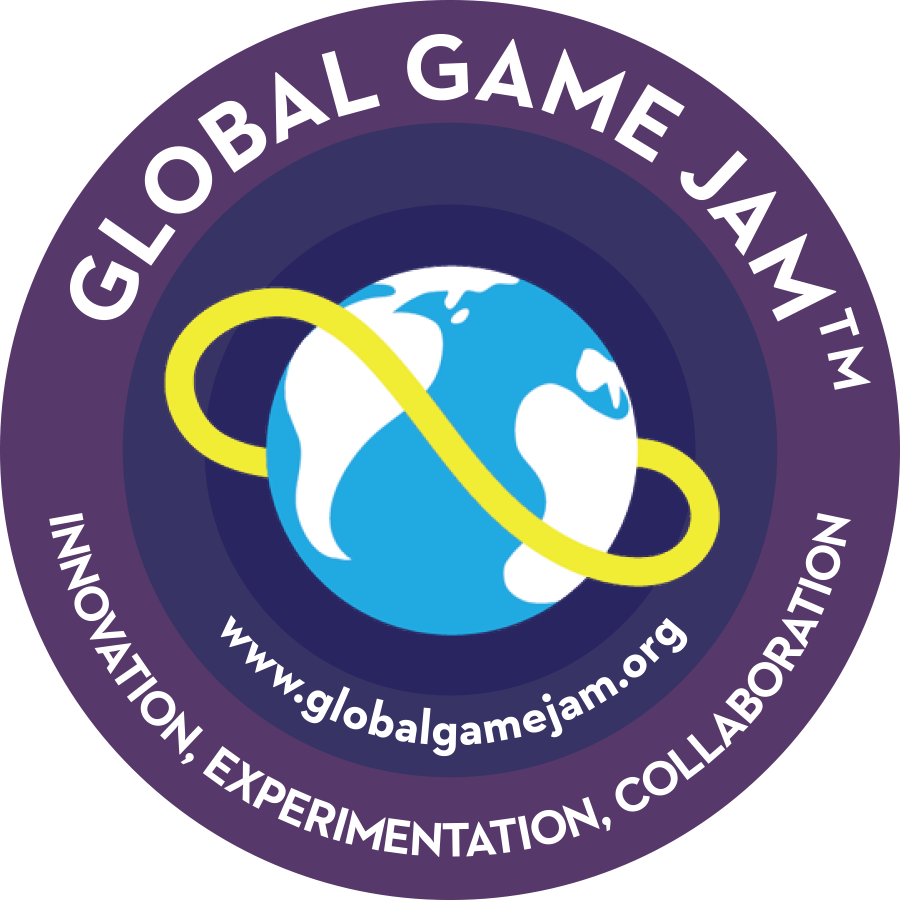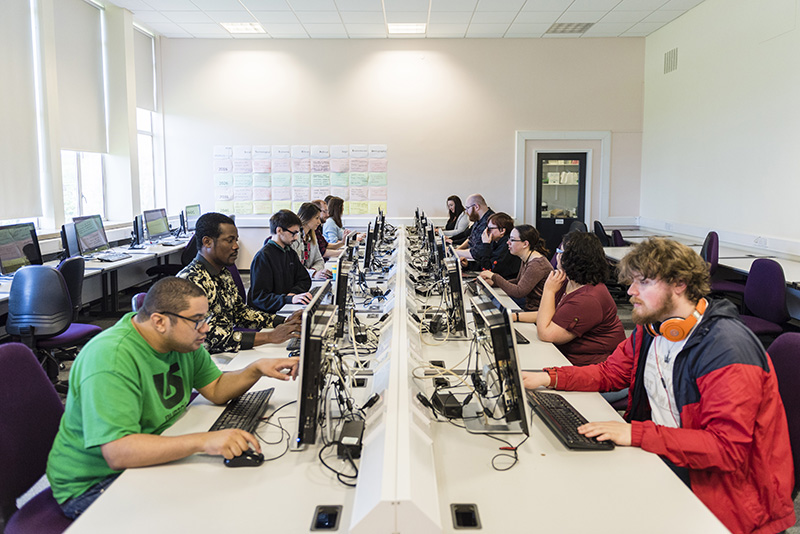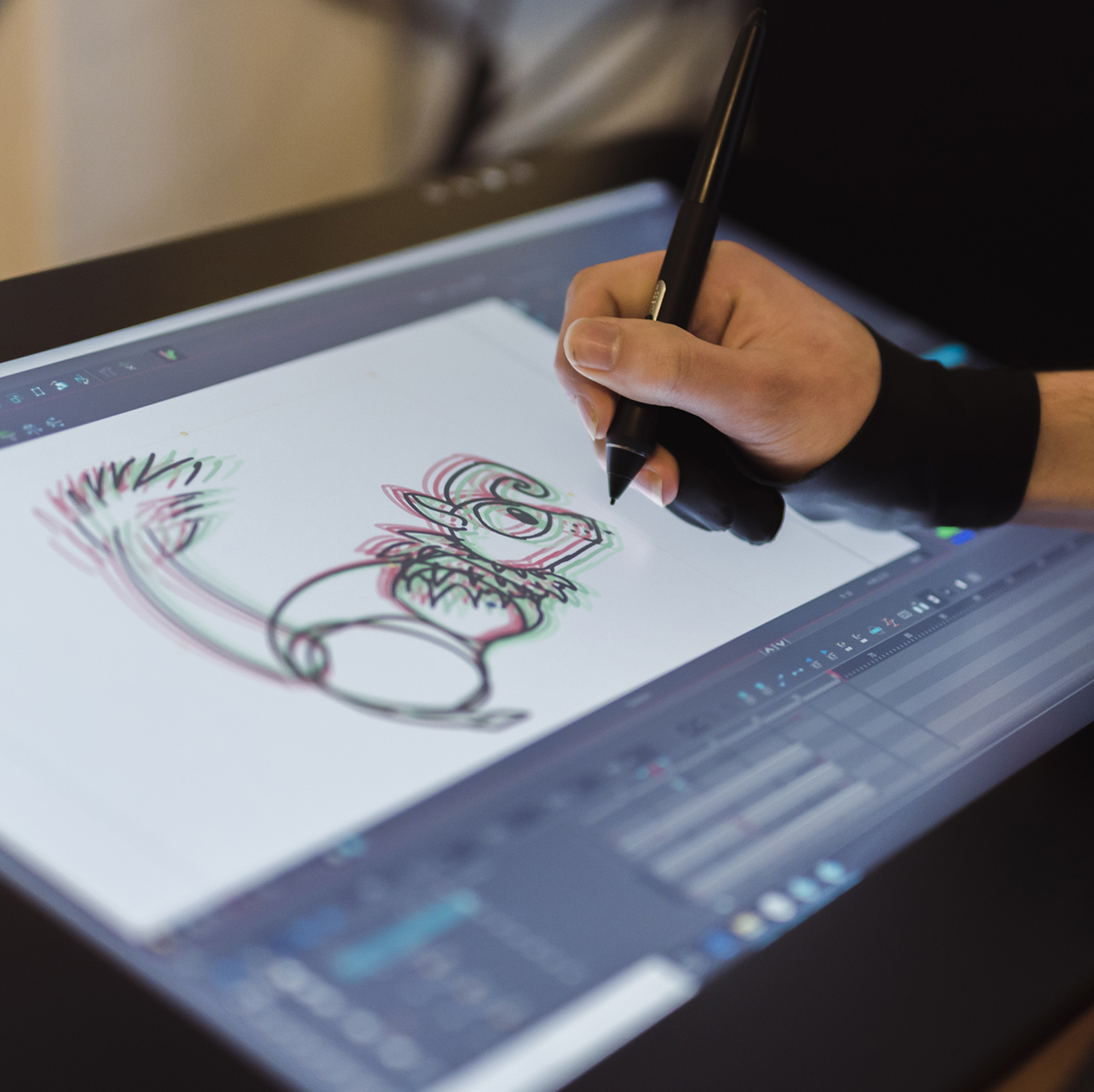BSc (Hons) Computer Game Development

Course details
UCAS Code
G451
Year of entry
2026
Duration
3 YRS (FT) 5 YRS (PT)
UCAS Tariff
96-112
Institution Code
G53
Location
Wrexham
Why choose this course?
This technical course delivers the expertise required to design and develop game projects. The course specialises in game design, game programming, 3D development software and agile production to build industry skills and develop a high-quality portfolio.
You will:
- Gain valuable experience and insight by having the creative freedom to manage the development of your own game projects
- Have full access to the Creative Industries Building, including primary access to our modern Game Development Suite, Design Studio, Podcast Suite, and TV Studio
- Enjoy the benefits of close industry engagement with regular visits, notable guest speakers, presentations, discussion groups, and social events
- Benefit from our internal Mentorship system, providing the opportunity to be matched with an experienced postgraduate student
- Build a strong set of critical employability skills across technical and professional areas to support you into industry or self-employment
- Join the flourishing network of Welsh creatives


Key course features
- This course emphasises projects and portfolio work to allow you to demonstrate skills through content development and portfolio pieces.
- The course will train you in the character and creature production workflows, from the concept phase through to full game engine implementation.
- Explore Game Engine technologies with a focus on the use Unreal Engine 5 to create highly detailed real-time Environmental Art.
- Develop strong 2D & 3D design work, including Software packages such as Adobe Suite, Autodesk Maya, Substance Painter, and ZBrush.
- Collaborate with students across the Games and Media department to put together highly specialised teams with strengths in programming, design, art, and audio.
What you will study
YEAR 1 (LEVEL 4)
In the first year of study, you will be introduced to a variety of themes that relate to the development of game products across technical and design modules along with opportunities expand on your skills in a full game project. You will begin studying game design, 3D software and C++ programming in the first semester, and build on this to utilise Unreal Engine in semester 2 to create narratively inspired environments and trailers.
MODULES
- Game Design and Interaction: In this module, you will design and create a vertical slice of a 2D Indie Game in a collaborative group. You will be facilitated to make fun and bitesize 2D gameplay in simplified game creating software. This module is paired with Game Industry and Agile Production to replicate a full game production process.
- Game Asset Production: This Module introduces you to the fundamentals of 3D modelling and engine integration with asset development through developing a modular ‘Dungeon’ environment. A simple 3D workflow pipeline is introduced with primitive modelling, UVs creation and texturing. You will finalise the game asset pack by demonstrating it in Unreal Engine.
- Programming Fundamentals: This specialist module is designed to be an introductory module for traditional programming methods for Game Development. You will study the programming language of C++ and the basics structures of creating game-based programs and technical demos.
- Game Environments & Narrative Design: This is a multi-disciplinary module where you will utilise Unreal Engine to construct a 3D environment with narrative and artistic themes. You will use this environment to create a game trailer for a game you have yet to produce.
- Games Technology: This specialist module focuses on some key aspects of the development side of creating games and focuses on key STEM themes and how they related to real-world technical game problems.
- Game Industry and Agile Production: This module is an introduction to a range of themes across game industry and production. This module pairs with Game Design & Interaction to allow you to deliver Agile production against a live game project.
YEAR 2 (LEVEL 5)
The second year of study will build of the foundations of the first and will encourage you to start to specialise in a specific area. In the first semester, you will study two specialist modules and explore the world of programming and developing games in a more detailed way, including starting to create C++ based game projects with Unreal Engine. In the second semester, the focus will shift to student-led, multi-disciplinary 3D game project in which you will be required to manage and deliver a significant vertical slice of a 3D game whilst maintaining a professional management methodology.
MODULES
- Games Programming: This specialist module builds upon your previous knowledge of C++ to develop technical demos that demonstrate concepts of Object-Oriented Programming within game engines such as Unreal Engine in C++. Work will build sequentially in this module to resolve into a polished technical portfolio piece.
- Mobile Game Development: This specialist module explores themes of optimised game development through the lens of creating smaller technical demos that can be demonstrated on mobile hardware. You will produce technical portfolio items that demonstrate a balanced approach to visual and non-visual scripting.
- Asset Production for Game Engines: This module introduces the full development pipeline for high to low poly modelling focusing on optimisation and texturing. You are facilitated through the full workflow pipeline with a small asset, then are tasked with reapplying the workflow from a 2D concept of your choice. This will reinforce your knowledge of the workflow and provides two opportunities for portfolio work.
- Serious Game Design: This module aims to introduce concepts of serious game design and development whilst relating it to the wider context of the games industry. This module examines the subject of serious games and its related terms such as gamification, applied games and simulation. You will demonstrate and apply your knowledge and understanding of traditional game design through a development prototype with a real-world serious application.
- Group Project: This module is the first of two significant games projects in the programme. This module will require you to develop a vertical slice of a 3D game in Unreal Engine. You will demonstrate work through collaborative teamwork that showcase diverse set of skills across game design, art, development and enterprise.
- Indie Studio Management: This module is designed to implement and facilitate management of a games project (Group Project) through the lens of an Indie Game studio. This module will discuss agile, reflective and collaborative work through a series of production meetings to discuss ongoing practice. You will be challenged with demonstrating your project as an industry standard indie games product.
YEAR 3 (LEVEL 6)
The final year of the course will further build on your subject specialisms, as the course starts to explore what graduate opportunities you have in the games industry – whether that be in a larger studio or in your own indie studio. You will have final core and specialist training modules; however, the area of development will be through the large-scale games project which will run from the start of the year until the summer.
MODULES:
- Game Industry Specialist: This module will task you to break down and analyse job roles and areas within the contemporary games industry. This will include action planning for the last year of undergraduate study and will be finalised in a formal simulated interview process for a specific contemporary game industry position.
- Advanced Games Programming: This specialist module is designed to further explore your technical knowledge of C++ to develop game mechanics and systems in game engines. You will also be challenged to maintain and enhance existing code, along with implementing new features in C++. You will create polished portfolio pieces that demonstrate technical skills with an engaging and enterprising attitude.
- Advanced Asset Production and Technical Art: This module tasks you to produce a project with a focus on your own developing specialism in line with contemporary job roles within the games industry. This module will allow you to approach 3D technology and asset production from a range of design and technical perspectives to support your ongoing specialist practice. The projects must be showcased as a portfolio piece and demonstrated with rational on how the project benefits your chosen specialist area.
- Advanced Game Design and User Engagement: You will prepare, setup, test and gather data through user testing/ play testing of a live project (Project) and produce improvements based on the outcome of the tests. The benefit of this module is that it will allows you to fine tune the project through your own roles within the development.
- Project: This module is designed to be the pinnacle of student achievement across the programme. You will create a substantial games project that will require a wide range of skills from a collaborative group. You will act as Indie Studios and be encouraged to pursue regional and national funding schemes to produce a well-rounded games product and release it on a portfolio platform.
The information listed in this section is an overview of the academic content of the programme that will take the form of either core or option modules. Modules are designated as core or option in accordance with professional body requirements and internal academic framework review, so may be subject to change.
Entry requirements & applying
The academic requirements for the course are 96-112 UCAS tariff points at GCE A-level or equivalent including a good pass in IT, Computing, Maths or Physics.
Teaching & Assessment
How you’ll be taught
Teaching and learning on this course are designed to support students from a variety of diverse backgrounds. Students will be able to access their tutors both during sessions and outside of sessions to get help and support from their tutors. Where relevant, additional staff may be part of the learning environment to support, such as Learning Support Assistants, Personal Assistants, and Sign Language interpreters.
This course uses a combination of learning environments including significant use of computer lab rooms, production and assessment meeting rooms, collaborative working environments, and lecture theatres. All delivered sessions will be supported by our VLE platform Moodle, with content such as internal and external videos, lecture slides, additional notes, and important links and files that will always be available.
During your first year of study, you will be timetabled into four tutor-led sessions a week, usually over three days, with the remaining time suggested for self-directed learning. These directed sessions will run at between two or three hours each depending on the module. Some modules will be taught with the wider games suite and will include students from other games courses, and some will be purely for students on Computer Game Development. All modules are delivered within the games team with the games suite.
How you’ll be assessed
Due to the nature of the subject, the course is portfolio-focused with students creating work that represents their development and has no formal exams.
Assessment methods include the production of games and game elements, practical work, presentations and pitches, assessment meetings, technical documentation, production data, and portfolio submissions. Additionally, during project modules, additional strategies will be in place to track and balance work within teams to ensure fair assessment and consistent development over longer periods of time.
Teaching and Learning
We offer workshops and support sessions in areas such as academic writing, effective note-making and preparing for assignments.
Students can book appointments with academic skills tutors dedicated to helping deal with the practicalities of university work. Our student support section has more information on the help available.
In terms of particular needs, the University’s Inclusion Services can provide appropriate guidance and support should any students require reasonable adjustments to be made because of a recognised prevailing disability, medical condition, or specific learning difference.
Career prospects
Our dedicated Careers and Employability team is committed to helping you achieve your professional goals. They provide personalised advice, useful resources, and extracurricular employability events to prepare you for the job market.
Graduates of this course can pursue careers in:
- Gameplay Programmer
- Game Designer
- Level Designer
- 3D Asset Artist
- Technical Artist
- Producer
- QA Test Analysis
- AI Programmer
- Software Engineer
- UI/UX Developer
- Scrum Master
Additionally, you may choose to further your expertise through postgraduate studies. Explore our postgraduate courses for more information.
Fees & funding
You do not have to pay your tuition fees upfront.
The fees you pay and the support available will depend on a number of different factors. Full information can be found on our fees & finance pages. You will also find information about what your fees include in the fee FAQs.
All fees are subject to any changes in government policy, view our undergraduate fees.
For international students looking to study this course please see our international fees.
Accommodation
At Wrexham University, we offer on-campus en-suite rooms within our Wrexham Student Village. These private, fully furnished spaces are conveniently located, providing easy access to campus facilities, study areas, and social spaces. Plus, you’re just a 10-minute walk from the city centre!
With all bills included, free Wi-Fi, 24/7 security, and large social areas, you’ll find everything you need for a great student experience.
Explore our student accommodation options to find your perfect home away from home.
International
This course is open to international students, for information about the university’s entry requirements for EU/international students, please visit our international section.

